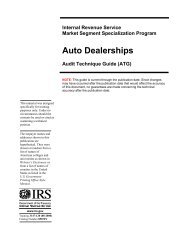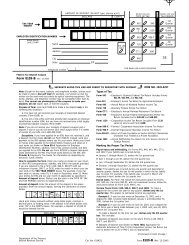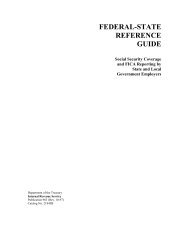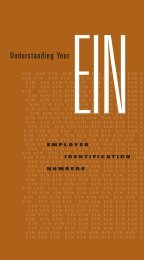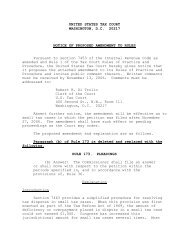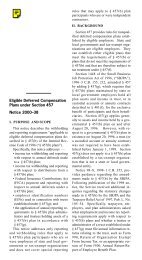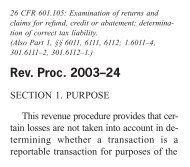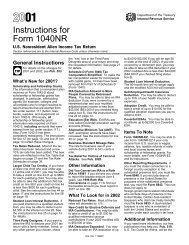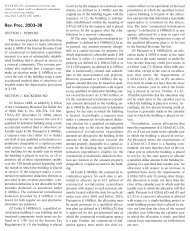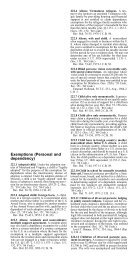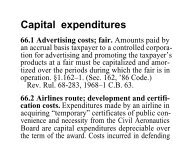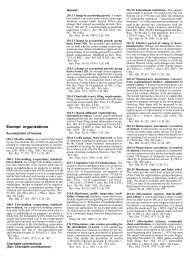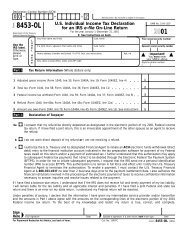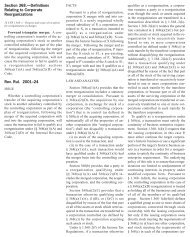Royalties
Royalties
Royalties
Create successful ePaper yourself
Turn your PDF publications into a flip-book with our unique Google optimized e-Paper software.
<strong>Royalties</strong><br />
<strong>Royalties</strong><br />
446.1 Accumulated; attributable to loss<br />
years. Where mineral property is leased under an<br />
agreement that royalties will accumulate but not<br />
become payable until the mine operates at a profit,<br />
depletion on the accumulated royalties should be<br />
deducted in the year of receipt or accrual. A.R.M.<br />
17, superseded. §§1.446-1, 1.611-2. (Secs. 446,<br />
611; ’86 Code.)<br />
Rev. Rul. 68-565, 1968-2 C.B. 263.<br />
446.2 Advance; cash and nonrecourse notes.<br />
Neither a cash nor an accrual basis taxpayer may<br />
deduct as advanced mineral royalties either the<br />
amount of actual cash payments or non recourse<br />
notes that are payable only to the extent of the proceeds<br />
received from the sale of the minerals. The<br />
cash paid is a deferred expense to be taken into<br />
account as part of the cost of the minerals sold,<br />
§1.612-3. (Sec. 612, ’86 Code.)<br />
Rev. Rul. 80-73, 1980-1 C.B. 128.<br />
446.3 Advance; coal; substantially uniform.<br />
An accrual method limited partnership entered<br />
into a sublease under which it was to pay a royalty<br />
based on coal production, an advanced payment<br />
recoupable from future coal production royalties,<br />
and, in subsequent years, a minimum advanced<br />
payment based on the prior 3 years coal production.<br />
The advanced payment and the payments in<br />
subsequent years are not substantially uniform in<br />
amount and do not qualify as advanced royalties<br />
paid or accrued according to the minimum royalty<br />
provisions under reg. 1.612-3(b)(3). §1.612-3.<br />
(Sec. 612, ’86 Code.)<br />
Rev. Rul. 79-381, 1979-2 C.B. 244.<br />
446.4 Advance; consumer price index adjustments.<br />
A taxpayer entered into a lease under<br />
which it is to pay an annual advanced minimum<br />
royalty. The designated annual advanced royalty<br />
payments are to be adjusted annually as a result of<br />
changes in the Consumer Price Index (CPI). The<br />
advanced payments, thus adjusted as a result of a<br />
change in the CPI, will qualify as advanced minimum<br />
royalty payments paid in connection with a<br />
mineral property. §1.612–3. (Sec. 612, ’86 Code.)<br />
Rev. Rul. 81-299, 1981-2 C.B. 138.<br />
446.5 Advance; depletion computation.<br />
Advanced royalties that a taxpayer paid under a<br />
mineral lease and elected to deduct from gross<br />
income in the year of payment must be excluded<br />
from gross income from the property for purposes<br />
of computing percentage depletion for the subsequent<br />
year in which the mineral is produced and<br />
sold. Such royalties are not deductible from gross<br />
income, as defined in section 61, in the year of production.<br />
§§1.612-3, 1.613-2. (Secs. 612, 613; ’86<br />
Code.)<br />
Rev. Rul. 79-386, 1979-2 C.B. 246.<br />
446.6 Advance; loan agreement. A composer<br />
assigned copyrights to subsidiaries and their parents<br />
loaned him $50,000 for which he executed ten<br />
$5,000 non-interest-bearing notes, payable one a<br />
year for 10 years. The first note was paid by applying<br />
$5,000 of royalties due him in the year of the<br />
loan. Held, the $50,000 was a loan, not advance<br />
royalties, except to the extent of the royalties<br />
earned and applied to the note. (Sec. 61, ’86 Code.)<br />
Harold Arlen, 48 T.C. 640, Acq., 1968-1 C.B.<br />
2.<br />
446.7 Advance; oil and gas leases; percentage<br />
depletion. Taxpayers who received advance royalty<br />
or lease bonus income from lessees of their oil<br />
and gas property interests in 1975 are entitled to an<br />
allowance for percentage depletion for that year<br />
even though no oil or gas was produced until 1976,<br />
§1.613A. (613A, ’86 Code.)<br />
Engle, 464 U.S., Ct. D. 2023, 1984-1 C.B. 148.<br />
446.8 Advance; plan of liquidation. Advance<br />
royalty payments received in 1977 by a calendaryear<br />
corporation, subsequent to the adoption of a<br />
plan of complete liquidation, for coal that is mined<br />
on land it has owned for more than 9 months qualify<br />
as payments received from a “sale or<br />
exchange” of property for purposes of section<br />
337(a). However, if the right to mine coal under<br />
the contract expires, terminates, or is abandoned<br />
before the coal is mined, the corporation must treat<br />
the payments attributable to the unmined coal as<br />
ordinary income. §§1.337–1, 1.631-1. (Secs. 337,<br />
631; ’86 Code.)<br />
Rev. Rul. 77-109, 1977-1 C.B. 87.<br />
446.9 Advance; timber. Advanced royalties<br />
paid or accrued by a lessee under a timber cutting<br />
contract in a taxable year for timber not cut during<br />
that year are nondeductible under the provisions of<br />
reg. 1.612–3(b)(3), but are to be added to the lessee’s<br />
depletable basis in the timber. §§1.612–3,<br />
1.631-2. (Secs. 612, 631; ’86 Code.)<br />
Rev. Rul. 77-400, 1977-2 C.B. 206.<br />
446.10 Advance; when deductible. A taxpayer<br />
who pays or accrues advance minimum royalties<br />
in connection with the lease of mineral property<br />
may currently deduct only that portion of the minimum<br />
royalties due over the term of a lease that is<br />
properly attributable to the current tax year, Rev.<br />
Ruls. 70-20 and 74-214 revoked. Amplified by<br />
Rev. Rul. 80-70. §§1.446-1, 1.461-1, 1.612-3,<br />
301.7805-1. (Secs. 446, 461, 612, 7701, 7805; ’86<br />
Code.)<br />
Rev. Rul. 77-489, 1977-2 C.B. 177.<br />
446.11 Advance; when deductible. An<br />
advanced mineral royalty resulting from a minimum<br />
royalty provision and covering a 12-month<br />
period extending beyond the taxable year when<br />
paid or incurred is not fully deductible in the year<br />
when paid or incurred. Only the portion properly<br />
attributable to the current taxable year is deductible<br />
in the current taxable year. The cost of minerals<br />
extracted in subsequent years must be reduced<br />
by the advanced royalties deducted to date. Rev.<br />
Rul. 77-489 amplified. §§1.461-1, 1.612-3.<br />
(Secs. 461, 612; ’86 Code.)<br />
Rev. Rul. 80-70, 1980-1 C.B. 104.<br />
446.12 Assigned coal leases; controlled corporations.<br />
Taxpayer-shareholder assigned coal<br />
property leases to his controlled corporation for<br />
overriding “royalties.” Held, only a portion of the<br />
amounts paid by the taxpayer were deemed excessive<br />
and therefore considered to be corporate dividends;<br />
amounts held to be royalties were fully<br />
deductible by the corporation and the difference<br />
between the royalties received by the taxpayer and<br />
the overriding royalties he paid to others was taxable<br />
as capital gains. (Secs. 162, 631; ’86 Code.)<br />
Robert Lee Merritt, 39 T.C. 257, Acq., 1967-2<br />
C.B. 3.<br />
446.13 Coal; interest in lease received for services.<br />
A royalty interest in a coal lease received by<br />
an individual from a coal company for services in<br />
obtaining that lease, or other leases, for the com-
<strong>Royalties</strong><br />
pany is not subject to capital gains treatment under<br />
section 631(c), but is ordinary income subject to<br />
percentage depletion. Amounts received by the<br />
individual for obtaining coal leases determined by<br />
a rate per ton of coal purchased and processed by<br />
the coal company are not subject to capital gains<br />
treatment, but are ordinary income not subject to<br />
depletion. §§1.611-1, 1.631-3. (Secs. 611, 631;<br />
’86 Code.)<br />
Rev. Rul. 77–84, 1977–1 C.B. 173.<br />
446.14 Coal; surface lease. Royalty payments<br />
received under a lease granting the lessee the right<br />
to enter upon, use and/or destroy surface lands in<br />
order to prospect for and mine coal, the extraction<br />
of which is or will be covered by other leases, are<br />
not proceeds from the disposal of coal within the<br />
meaning of section 631(c). §1.631–3. (Sec. 631,<br />
’86 Code.)<br />
Rev. Rul. 79-144, 1979-1 C.B. 219.<br />
446.15 Coal land; advance; interest v. royalties.<br />
A partnership disposed of its working interest<br />
in leased coal property by contracting, as part of<br />
the same transaction, for a mining company to<br />
strip all the overburden from the tract in incremental<br />
parcels and for the mining company to sublease<br />
each parcel after stripping of the parcel was completed.<br />
Advances to the mining company for use<br />
in stripping the parcels under the sublease agreement<br />
to be repaid to the partnership in an amount<br />
equal to the amounts advanced constitute a loan,<br />
not development costs, Amounts received by the<br />
partnership exceeding repayment of the loan and<br />
interest are royalties from the sale of coal; stripping<br />
costs incurred by the mining company are<br />
operating cost, nondevelopment costs. §§1.616–1,<br />
1.631–3. (Secs. 616, 631; ’86 Code.)<br />
Rev. Rul. 77–308, 1977–2 C.B. 208.<br />
446.16 Coal land; exercise of option to purchase.<br />
Royalty payments received in exchange for<br />
an option to purchase coal land are not subject to<br />
capital gains treatment under section 631(c), but<br />
are taxable as ordinary income and subject to<br />
depletion deductions. §§1.61-8, 1.611-1,<br />
1.613-1, 1.631-3, 1.1231-1. (Secs. 61, 611, 613,<br />
631, 1231; ’86 Code.)<br />
Rev. Rul. 73-80, 1973–1 C.B. 308.<br />
446.17 Coal land; lease to joint venture;<br />
interest of lessor. Royalty income received by a<br />
power company for the lease of its coal lands, held<br />
more than six months, to a joint venture that<br />
included as a member the company’s wholly<br />
owned subsidiary and that sells the coal to the<br />
company is subject to the capital gains treatment<br />
under section 631. §§1.631-3, 1.1231–1. (Secs.<br />
631, 1231; ’86 Code.)<br />
Rev. Rul. 73–33, 1973–1 C.B. 307.<br />
446.18 Coal lease agreement between members<br />
of affiliated group; economic interest<br />
retained. An arms-length coal lease agreement in<br />
1972 between members of an affiliated group filing<br />
consolidated returns, in which the owner-lessor<br />
retained an economic interest and the lessee<br />
obtained the right to mine and dispose of the coal,<br />
does not constitute a deferred intercompany transaction<br />
within the meaning of reg. 1.1502–13<br />
(a)(2)(i) or (iii). Section 631(c) applies to the royalty<br />
payments received by the owner-lessor.<br />
§§1.611-1, 1.631–3, 1.1502-13. (Sec. 611, 631,<br />
1502; ’86 Code.)<br />
Rev. Rul. 74-10, 1974-1 C.B. 251.<br />
446.19 Coal or iron ore; bonuses and<br />
advanced royalties; rulings. As a condition to<br />
issuing a ruling that lessors of coal and iron ore<br />
may treat bonuses or advanced royalties as<br />
received from a sale of coal or iron ore under section<br />
631(c), the lessors will be required to enter<br />
into a closing agreement with respect to their tax<br />
liability. §1.631–3. (Sec. 601, 201, S.P.R.; Sec.<br />
631, ’86 Code.)<br />
Rev. Proc. 77-11, 1977-1 C.B. 568.<br />
446.20 Contested; accrual basis taxpayer. An<br />
accrual-method corporation and another company,<br />
under a cross-licensing and royalty agreement,<br />
paid each other a 2-percent royalty on the<br />
contract price of items covered by the other’s patents.<br />
Under the Royalty Adjustment Act of 1942,<br />
the Navy Department determined the royalties to<br />
be excessive for Navy contracts, and ordered the<br />
royalties suspended and the government reimbursed.<br />
After appeal, a compromise 1-percent royalty<br />
rate was reached. Held, the corporation was<br />
entitled to deduct royalties payable at the rate of 2<br />
percent while they remained legally contested but<br />
was not required to include the contested royalties<br />
receivable in income. (Secs. 41, 43, ’39 Code;<br />
Secs. 446, 461, ’86 Code.)<br />
Foster Wheeler Corp., 20 T.C. 15, Acq., 1953-2<br />
C.B. 4.<br />
446.21 Escrow account; ownership in dispute.<br />
Royalty payments deposited in escrow<br />
pending litigation regarding ownership of land are<br />
not to be included in the lessor’s income for the<br />
years in which they would otherwise have been<br />
payable, but should be reported as income for the<br />
year in which the litigation is settled or the lessor’s<br />
right to the royalties is established in some other<br />
way. I.T. 1212 superseded. §1.451–1. (Sec. 451,<br />
’86 Code.)<br />
Rev. Rul. 70-66, 1970-1 C.B. 114.<br />
446.22 Exempt organization; beneficial<br />
owner of patents. Amounts received from licensees<br />
by an exempt organization, the legal and beneficial<br />
owner of patents assigned to it by inventors<br />
for specified percentages of future royalties,<br />
constitute royalty income that is excludable in<br />
computing unrelated business taxable income.<br />
Rev. Rul. 73-193 distinguished. §1.512(b)-1.<br />
(Sec. 512, ’86 Code.)<br />
Rev. Rul. 76-297, 1976-2 C.B. 178.<br />
446.23 Exempt organization; patent development<br />
deductions. Patent development and management<br />
services fees deducted from royalties<br />
collected from licensees by an exempt charitable<br />
organization for distribution to beneficial owners<br />
of the patents is not within the exception for royalties<br />
provided by section 512(b) in determining<br />
“unrelated business taxable income” of the<br />
organization. Distinguished by Rev. Rul. 76–297.<br />
§1.512(b)-1. (Sec. 512, ’86 Code.)<br />
Rev. Rul. 73-193, 1973-1 C.B. 262.<br />
446.24 Foreign personal holding company<br />
income. A nonresident foreign corporation was<br />
entitled to a percentage of patent royalties paid by<br />
an American licensee to the foreign owner of the<br />
patents. Held, nonresident was contractually<br />
entitled to a percentage share in the owner’s<br />
income, not an interest in the patents or royalties<br />
as such; the payments received from the licensee<br />
were not received from sources within the U.S.<br />
and were not royalty income. (Secs. 119(a),<br />
502, ’39 Code; Secs. 543, 861, ’86 Code.)<br />
Hopag S.A. Holding de Participation et de Gestion<br />
de-Brevets Industriels, 14 T.C. 38, Acq.,<br />
1953-1 C.B. 4.<br />
446.25 Foreign trademark; initial U.S. sale.<br />
<strong>Royalties</strong> for the use of a foreign trademark on<br />
products that are ultimately used in foreign countries<br />
are income from sources without the U.S.<br />
even though the initial sale of the articles took<br />
place in the U.S. §§1.861-5, 1.862-1. (Secs. 861,<br />
862; ’86 Code.)<br />
Rev. Rul. 68-443, 1968-2 C.B. 304.<br />
446.26 Income in respect of decedent;<br />
decendent’s contract. Royalty payments<br />
received by a taxpayer under a contract executed<br />
by her mother (now deceased) as executrix of the<br />
estate of her father constitute taxable income to the<br />
taxpayer. However, she is entitled to deduct that<br />
portion of the estate tax paid which is attributable<br />
to the inclusion in the widow’s estate of the right<br />
to receive such royalty payments. Clarified and<br />
distinguished by Rev. Rul. 60-227. §1.691(a)-2.<br />
(Sec. 691, ’86 Code.)<br />
Rev. Rul. 57-544, 1957-2 C.B. 361.<br />
446.27 Income in respect of decedent; license<br />
arrangement; death of patent-holder. Where a<br />
contract between a patent owner and a manufacturer<br />
constitutes merely a “license” arrangement<br />
to manufacture and sell articles under the patent in<br />
return for the payment of royalties, and not a<br />
“sale,” royalty payments due and accrued under<br />
the contract at the date of the death of the inventor<br />
constitutes income in respect of a decedent. Royalty<br />
payments accrued after the date of death of the<br />
patent owner are ordinary income, includable in<br />
the gross income of the recipient. Rev. Rul.<br />
57-544 clarified and distinguished. §§1.61-8,<br />
1.691(a)-1. (Secs. 61, 691; ’86 Code.)<br />
Rev. Rul. 60-227, 1960-1 C.B. 262.<br />
446.28 Invention; stockholders paid for use.<br />
A corporation was allowed to deduct the cost of<br />
royalties paid to its two controlling stockholders<br />
for the use of their invention after the stockholders<br />
had given the corporation an irrevocable royaltyfree<br />
license to use the invention with the understanding<br />
that suitable compensation would be<br />
agreed upon at a later date. (Sec. 23(a), ’39 Code;<br />
Sec. 162, ’86 Code.)<br />
Heathbath Corp., 14 T.C. 332, Acq., 1957-2<br />
446.29 Mineral properties; interest retained.<br />
A grantor’s retention of a royalty interest payable<br />
out of mineral production is a retention of an economic<br />
interest, which makes the transaction<br />
incompatible with a sale; thus, lump sum payments<br />
received by him are ordinary income. Paul<br />
White decision not followed. §1.1231–1. (Sec.<br />
1231, ’86 Code.)<br />
Rev. Rul. 63-120, 1963–1, C.B. 141.<br />
446.30 Mineral properties; lump sum payment<br />
for rights. A lump sum payment received by<br />
the owner of land purportedly for fee simple title<br />
to all minerals in and under the land, but in conjunction<br />
with which he retained a royalty interest<br />
in any minerals produced from the land, is ordinary<br />
income and not proceeds from the sale of a<br />
capital asset. G.C.M. 27322 superseded.<br />
§§1.61-1, 1.1231-1. (Secs. 61, 1231; ’86 Code.)<br />
Rev. Rul. 69-352, 1969-1 C.B. 34.<br />
446.31 Mineral properties; lump sum payment<br />
for rights; interest retained. The lump sum<br />
payment received for a 65 percent interest in the<br />
minerals in place is not subject to a depletion<br />
allowance under section 611. The payment is for<br />
the sale of a capital asset defined in section 1221<br />
and entitled to capital gain treatment. §§1.611-1,<br />
1.1221-1. (Secs. 611, 1221; ’86 Code.)<br />
Rev. Rul. 82-221 1982–2 C.B. 113.<br />
446.32 Mineral properties; sale and leaseback<br />
with subsidiary. Where a parent corporation,<br />
for a price equivalent to book value, transfers<br />
mineral properties to a wholly owned subsidiary<br />
and leases back from the subsidiary for specified<br />
royalty payments in order to benefit from the<br />
allowance of both cost and percentage depletion,<br />
the transaction will be disregarded. §§1.61–3,<br />
1.162-1, 1.611-1, 1.612-1, 1.613–1. (Secs. 61,<br />
162, 611, 612, 613; ’86 Code.)<br />
Rev. Rul. 68-430, 1968-2 C.B. 44.<br />
446.33 Nonresident alien; author; withholding.<br />
Royalty payments made by a domestic publisher<br />
to a nonresident alien author while visiting<br />
the U.S., or to his designated domestic bank or resident<br />
agent, are subject to income tax withholding.
Further, when payment is to a resident agent and<br />
the author’s status is unknown to the publisher the<br />
duty of withholding devolves upon the agent. I.T.<br />
2524 superseded. §§1.861-5, 1.871-2, 1.1441-2,<br />
1.6851-2. (Secs. 861, 871, 1441, 6851; ’86 Code.)<br />
Rev. Rul. 70-468, 1970-2 C.B. 171.<br />
446.34 Nonresident alien; bank as tax agent;<br />
withholding. A domestic corporation is not<br />
relieved from the requirement to withhold tax at<br />
the rate of 30 percent from royalties paid to a nonresident<br />
alien by reason of the fact that the alien<br />
has appointed a domestic bank to act as his agent<br />
for purposes of paying his taxes in the U.S. O.D.<br />
1087 superseded. §§1.871–1, 1.1441-4. (Secs.<br />
871, 1441; ’86 Code.)<br />
Rev. Rul. 69-655, 1969-2 C.B. 168.<br />
446.35 Nonresident alien; books and stories<br />
published in U.S. Payment received by a nonresident<br />
alien author from a domestic corporation<br />
under a contract granting the corporation the first<br />
American serial rights in his exclusive output of<br />
both long and short stories and the right to publish<br />
in the U.S. all his new books, but not prescribing<br />
in any manner what or when he is to write, are royalties<br />
from sources within the U.S. subject to withholding<br />
at the 30 percent tax rate. §1.871-1. (Sec.<br />
871, ’86 Code.)<br />
Rev. Rul. 76-555, 1974-2 C.B. 202; Rev. Rul.<br />
76-283, 1976-2 C.B. 222.<br />
446.36 Nonresident alien; books printed in<br />
U.S.; withholding. Royalty payments made by a<br />
domestic corporation to a nonresident alien for<br />
books printed in the U.S. by the corporation and<br />
sold exclusively in a foreign country under that<br />
country’s copyrights are not taxable as income<br />
from sources within the U.S. and, therefore, are<br />
not subject to income tax withholding. I.T. 3296<br />
superseded. §§1.861-5, 1.862-1, 1.1441-2.<br />
(Secs. 861, 862, 1441; ’86 Code.)<br />
Rev. Rul. 72–232, 1972-1 C.B. 276.<br />
446.37 Oil and gas; information returns.<br />
Information return, Form 1099, required to be<br />
filed by the payers of oil and gas royalties, with<br />
respect to royalty payments aggregating $600 or<br />
more for a calendar year, must show the gross<br />
amounts due the royalty interest owners rather<br />
than the net amounts paid to such owners after<br />
withholding for various taxes levied by states.<br />
§1.6041-1. (Sec. 6041, ’86 Code.)<br />
Rev. Rul. 66-198, 1966-2 C.B. 488.<br />
446.38 Oil and gas in place. If a royalty interest<br />
in oil and gas in place is used by the owner in his<br />
trade or business, it is not a capital asset but will<br />
be subject to the provisions of section 1231 if held<br />
for more than six months; if the royalty is held for<br />
investment, gain or loss on its sale is a capital gain<br />
or loss; and if the royalty is held for sale in the ordinary<br />
course of business, gain or loss on its sale is<br />
ordinary gain or loss. Rev. Rul. 55–526 superseded.<br />
§§1.1221–1, 1.1222–1, 1.1231–1. (Secs.<br />
1221, 1222, 1231; ’86 Code.)<br />
Rev. Rul. 73-428, 1973-2 C.B. 303.<br />
446.39 Oil and gas lease; interest received for<br />
service. A corporate promoter, an attorney, and an<br />
employee of a closely held corporation, receive<br />
overriding royalty interests for services provided<br />
in connection with the acquisition/development of<br />
oil and gas leases. Each has received a property<br />
interest, the fair market value of which is includible<br />
in gross income under section 83. §1.83–1.<br />
(Sec. 83, ’86 Code.)<br />
Rev. Rul. 83-46, 1983-1 C.B. 16.<br />
446.40 Oil and gas lease; irrevocable trust for<br />
minors. Royalty income attributable to an undivided<br />
one-half of one-eighth nonparticipating royalty<br />
interest in an oil and gas lease, transferred to<br />
an irrevocable trust by a husband and wife for the<br />
benefit of their minor children, is includable in the<br />
trust’s gross income. However, any of the trust<br />
income used for the support or maintenance of the<br />
minors is included in the grantor’s gross income.<br />
§§1.61-1, 1.671-1. (Secs. 61, 671; ’86 Code.)<br />
Rev. Rul. 71-130, 1971-1 C.B. 28.<br />
446.41 Oil and gas lease; royalty transferred<br />
in trust. The donative assignment to a trust, established<br />
for the benefit of a college, of an overriding<br />
royalty interest created from an oil and gas leasehold<br />
presently owned and retained by the grantor,<br />
is not an anticipatory assignment of income. The<br />
trust income will not be taxable to the grantor even<br />
though the term of the trust is less than the economic<br />
life of the overriding royalty, providing the<br />
grantor is not considered the owner of the trust.<br />
§1.671-1. (Sec. 671, ’86 Code.)<br />
Rev. Rul. 67-118, 1967-1 C.B. 163.<br />
446.42 Oil and gas lease; undivided interest.<br />
No part of the royalty payments received by the<br />
lessor of an undivided interest in oil and gas producing<br />
properties, under a lease agreement providing<br />
that, from month to month, the royalty percentages<br />
could decrease or increase based on<br />
average daily gross production for the previous<br />
three consecutive month periods, is a production<br />
payment. §1.636-3. (Sec. 636, ’86 Code.)<br />
Rev. Rul. 76-34, 1976-1 C.B. 177.<br />
446.43 Patent; paid majority stockholderpresident.<br />
A royalty paid by a corporation to its<br />
majority stockholder-president for the use of a patent<br />
on an article manufactured by the corporation<br />
is deductible as a business expense, if the amount<br />
is reasonable. O.D. 440 superseded. §1.162–11.<br />
(Sec. 162, ’86 Code.)<br />
Rev. Rul. 69-513, 1969-2 C.B. 29.<br />
446.44 Patent; paid to nonresident alien by<br />
foreign corporation. An individual who is a citizen<br />
and resident of a foreign country with which<br />
the U.S. has no income tax convention licensed the<br />
U.S. rights on a patent to a Netherlands corporation<br />
that relicensed the rights to a U.S. corporation<br />
for use in the U.S. The patent royalties paid to the<br />
individual are subject to U.S. tax, and the Netherlands<br />
corporation is required to withhold the tax<br />
from the royalties. §§1.861-5, 1.871-7, 1.1441-1.<br />
(Secs. 861, 871, 1441; ’86 Code.)<br />
Rev. Rul. 80-362, 1980-2 C.B. 208.<br />
446.45 Patent; rights assigned to wife. A husband<br />
paid Federal gift taxes on an absolute assignment<br />
to his wife of his right to receive royalties<br />
under a patent sales contract. Held, the transaction<br />
was a transfer of ownership, not an assignment of<br />
income, and the husband was not taxable on the<br />
income received by the wife. (Sec. 22(a), ’39<br />
Code; Sec. 61, ’86 Code.)<br />
Franklin A. Reece, 24 T.C. 187, Acq., 1960-2<br />
C.B. 6.<br />
446.46 Patent; rights to trusts. The taxpayer<br />
transferred to irrevocable trusts, created for his<br />
wife and minor childern, the exclusive right, title,<br />
and interest in and to a patent application, receiving<br />
from the trusts a license to make, use, and sell<br />
the article covered in the application at a graduated<br />
royalty rate. The trusts were to continue until the<br />
children reached majority. The taxpayer retained<br />
no power to change the beneficiaries, direct the<br />
accumulation or withholding of income, or change<br />
trustees. Held, the trust income was not taxable to<br />
the taxpayer, and he could deduct the royalties<br />
paid under the license agreement as a business<br />
expense. (Secs. 22(a), 23(a), ’39 Code; Secs. 61,<br />
162, ’86 Code.)<br />
John T. Potter, 27 T.C. 200, Acq., 1957-2 C.B.<br />
6.<br />
446.47 Patent; transfer; retention of interest.<br />
The mere retention of an interest resembling a royalty<br />
by an assignor or transferor of a patent, in a<br />
transaction which otherwise has the characteristics<br />
of a sale but does not come within the purview<br />
of section 1235, will not, in and of itself, prevent<br />
capital gains treatment. Mim. 6490 and Rev. Rul.<br />
55-58 revoked. §§1.61-1, 1.1222-1, 1.1235-1.<br />
(Secs. 22(a), 117(a), ’39 Code; Secs. 61, 1222,<br />
1235, ’86 Code.)<br />
Rev. Rul. 58-353, 1958-2 C.B. 408; Edward C.<br />
Myers, 6 T.C. 258, Roy J. Champayne, 26 T.C.<br />
634, Leonard Coplan, 28 T.C. 1189, Acqs.,<br />
1958-2 C.B. 4, 6.<br />
446.48 Personal holding company; oil and<br />
gas lease. Amounts received by a personal holding<br />
company under a lease agreement with a drilling<br />
company providing for the delivery to the lessor of<br />
a one-eighth part of the oil and gas produced and<br />
for the sale of such oil and gas to the lessee for a<br />
stipulated price are royalties for purposes of computing<br />
personal holding company income.<br />
§1.543-1. (Sec. 543, ’86 Code.)<br />
Rev. Rul. 73-332, 1973-2 C.B. 195.<br />
446.49 Personal holding company; sub-processing<br />
contract; secret formula. Payments<br />
received by a corporation from a partnership<br />
whose three partners are equal owners of the corporation’s<br />
stock pursuant to a sub-processing contract<br />
containing a secret formula are royalty payments<br />
includable as personal holding company<br />
income. 1.543–1. (Sec. 543, ’86 Code.)<br />
Rev. Rul. 71-596, 1971–2 C.B. 242.<br />
446.50 Publishers and literary agents;<br />
information returns. A publisher making royalty<br />
payments directly to an author, aggregating $600<br />
or more in a calendar year, must file information<br />
returns showing the payments made to the author<br />
and the author’s identifying number. If payment is<br />
made directly to a literary agent in behalf of the<br />
author it must be reported as such, with the agent’s<br />
identifying number. In the latter case the agent<br />
must file information returns for the royalties<br />
received from the publisher showing the gross<br />
amount received, commission retained, and net<br />
amount paid over to the author, together with the<br />
author’s identifying number. Modified to provide<br />
that literary agents must report the gross amount<br />
or royalties received prior to the deduction of fees,<br />
commissions, and expenses. §§1.6041-1,<br />
1.6109-1. (Secs. 6041, 6109; ’86 Code.)<br />
Rev. Rul. 65–129, 1965–1 C.B. 519; Rev. Rul.<br />
67-197, 1967-1 C.B. 319.<br />
446.51 Swedish convention; right to distribute<br />
motion picture films. A payment to a Swedish<br />
resident, corporation, or other entity for the<br />
right to distribute motion picture films in the U.S.<br />
is considered a royalty under Article VI of the<br />
U.S.-Sweden Income Tax Convention for Federal<br />
income tax purposes.<br />
Rev. Rul. 70-134, 1970-1 C.B. 359.<br />
446.52 Swiss convention; net profits interest<br />
in oil and gas mineral property. Payments<br />
received by a Swiss corporation from its net profits<br />
interest in oil and gas mineral property located<br />
in the U.S. are not industrial and commercial profits<br />
within the meaning of Article II(1)(h) of the<br />
U.S.-Swiss Confederation Income Tax Convention<br />
but are rents or royalties taxable by the U.S.<br />
pursuant to Article IX(1) of the Convention.<br />
Rev. Rul. 73-419, 1973-2 C.B. 436.<br />
446.53 Unpatented invention. Percentage payments<br />
the taxpayer received from a corporation to<br />
which he had transferred complete ownership of a<br />
perfected but unpatented invention were part of its<br />
purchase price and reportable as long-term capital<br />
gain, not ordinary income. (Sec. 117, ’39 Code;<br />
Sec. 1231, ’86 Code.)<br />
Franklin S. Speicher, 28 T.C. 938, Acq., 1958-2<br />
C.B. 7.



